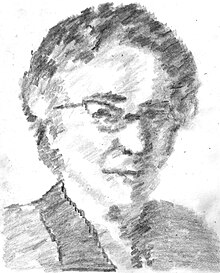Helen Gardner (critic)
| Helen Gardner | |
|---|---|

Pencil sketch of Dame Helen Gardner
|
|
| Born | Helen Louise Gardner 13 February 1908 Finchley, Middlesex, England, UK |
| Died | 4 June 1986 (aged 78) Bicester, Oxfordshire, England, UK |
| Occupation | Professor |
| Language | English |
| Nationality | British |
| Education | North London Collegiate School |
| Alma mater | St Hilda's College, Oxford |
| Genre | Literary criticism |
| Notable works | The New Oxford Book of English Verse |
| Notable awards | Order of the British Empire |
Professor Dame Helen Louise Gardner DBE (13 February 1908 – 4 June 1986) was an English literary critic and academic. She was best known for her work on the poets John Donne and T. S. Eliot.
Helen Louise Gardner was born in Finchley, Middlesex in 1908, the middle child and only daughter of the journalist Charles Gardner and his wife, also named Helen. She was eleven when her father died and the family thereafter made their home with her grandparents. Helen's mother was highly ambitious for her gifted daughter, who demonstrated artistic talent from an early age. Gardner's early education was at the North London Collegiate School. In 1926 she went to St Hilda's College, Oxford, and in 1929 obtained a first-class honours degree in English language and literature: in 1935 she became M.A. (University of Oxford).
Her teaching career began at the University of Birmingham, where she held a temporary post. After three years as an assistant lecturer at Royal Holloway College in London, she returned to Birmingham, as a member of the English department (1934–41). She became a tutor at Oxford in 1941 and was a fellow of St Hilda's College, Oxford from 1942. In 1966, she became Merton Professor of English literature in the University of Oxford, the first woman to hold this chair. Her specialist areas were T. S. Eliot, the metaphysical poets, Milton and religious poetry, with many essays published on these subjects, as well as on literary criticism itself. She edited The New Oxford Book of English Verse, 1250–1950 (1972) and The Metaphysical Poets. She retired from the chair in 1975.
Her 1949 collection of essays, The Art of T. S. Eliot, is regarded a seminal work on the poet. In particular, she challenged the notion that Eliot was only accessible to those well-versed in his many allusions:
...
Wikipedia
